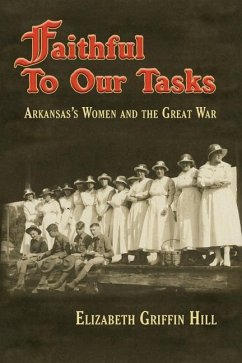The United States was a vital, if brief, participant in World War I--spending only eighteen months fighting in "the Great War." But that short span marked an era of tremendous change for women as they moved out of the Victorian nineteenth century and came into their own as social activists during the early years of the twentieth century. Faithful to Our Tasks provides the context for women's actions and reactions during the war. It incorporates the mitigating factors and experiences of American women in general and compares Arkansas women's Progressive Era actions with those of other southern women. The contextual underpinnings provide a rich tapestry as we attempt to understand our grandmothers and great-grandmothers' responses to wartime needs. Primary records of the World War I era, accessed in archives in central Arkansas, reveal that the state's organized women were suddenly faced with a devastating world war for which they were expected to make a significant contribution of time and effort. "Club women" were already tackling myriad problems to be found in abundance within a poor, rural state as they worked for better schools, a centralized education system, children's well-being, and improved medical care. Under wartime conditions, their contributions were magnified as the women followed a barrage of directions from Washington, DC, within a disconcerting display of micromanagement by the federal government. The important takeaway, however, is that the Great War created a scenario in which Arkansas's organized women--as well as women throughout the nation--would step forward and excel as men and governments stood up and took notice. After the war, these same organized women won the right to vote.
Hinweis: Dieser Artikel kann nur an eine deutsche Lieferadresse ausgeliefert werden.
Hinweis: Dieser Artikel kann nur an eine deutsche Lieferadresse ausgeliefert werden.








